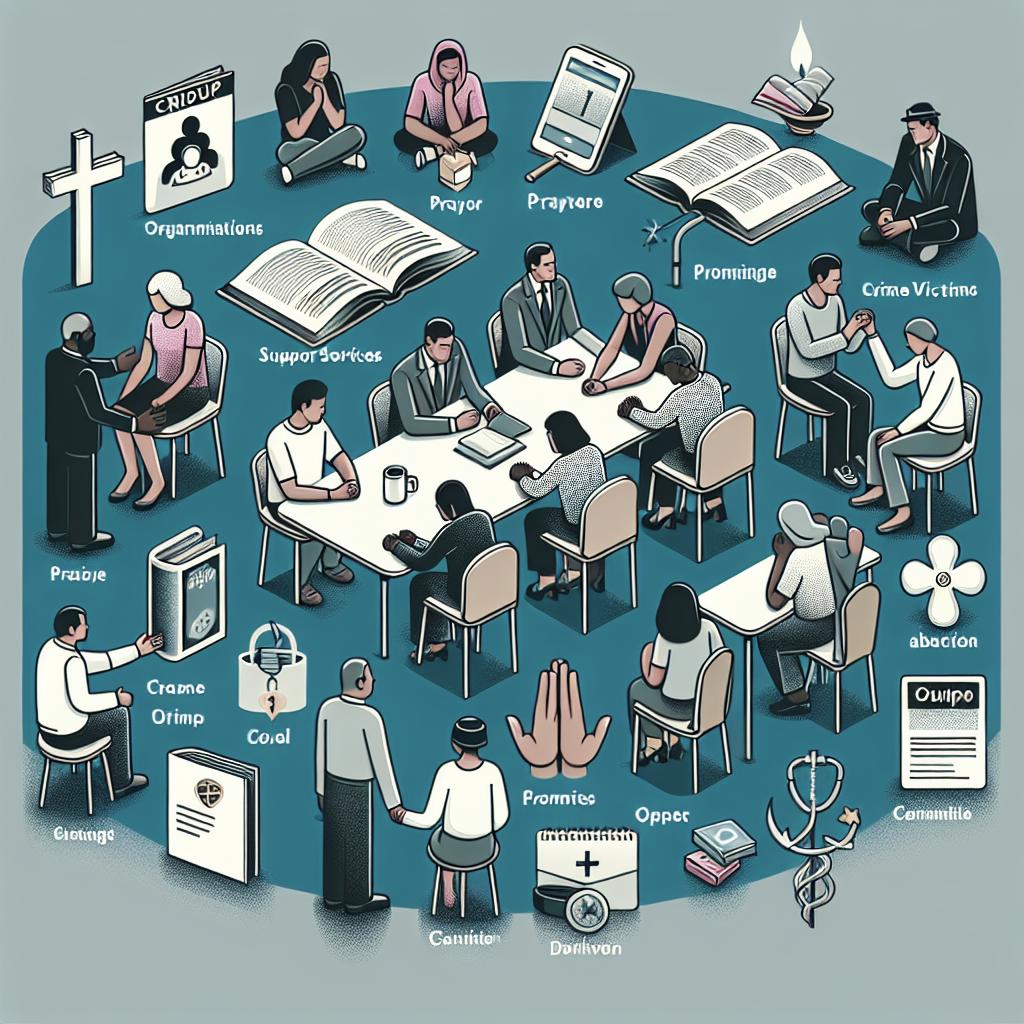“`html
How Faith-Based Organizations Support Crime Victims
Faith-based organizations have long been pillars in communities, providing support, guidance, and resources during times of need. For crime victims, these organizations can offer a unique blend of emotional, spiritual, and practical support. This blog post delves into the ways in which faith-based groups assist victims of sexual violence, the dual role of faith traditions, and the partnerships they forge to enhance their impact. By providing educational initiatives, interfaith training, and specific resources, these organizations strive to create a supportive environment for healing. Technical assistance providers also play a crucial role in enhancing the capacity of faith communities to address the needs of crime victims.
Sexual Violence and Faith
Faith-based organizations are often among the first responders in cases of sexual violence in their communities. These groups have the capacity to provide emotional and spiritual relief to victims, offering them a sense of hope and support during incredibly challenging times. Leaders within these organizations are positioned to mobilize resources and provide extended networks of counseling, shelter, and advocacy tailored to individual needs.
Importantly, the approach taken by faith-based organizations can help victims find meaning and comfort within their spiritual beliefs. These organizations emphasize forgiveness, resilience, and dignity, helping crime victims reclaim their lives. By integrating spiritual healing with practical support services, faith-based organizations can be a comprehensive resource for those who have suffered trauma.
Healing Through a Faith Tradition
The healing process for crime victims often requires addressing not just the physical and emotional wounds but also the spiritual wounds inflicted by violence. Faith traditions have profound teachings and practices that are mobilized to assist in holistic healing. Through prayer, meditation, and communal support, victims can navigate their journey to recovery with the guiding force of their faith.
These traditions promote a framework of healing that includes forgiveness, compassion, and inner peace. By participating in religious services, community gatherings, or one-on-one pastoral care, victims often find that their spiritual path can offer powerful tools for recovery. Such practices are not only about self-help but also about community-building, creating networks that provide sustained support.
Faith Traditions Can be Assets or Roadblocks
While faith practices have the potential to aid recovery, they may sometimes themselves pose challenges. Certain rigid interpretations of faith doctrines can become barriers for crime victims, making survivors feel alienated or blame themselves for the violence suffered. When not addressed properly, these elements potentially discourage victims from reaching out for necessary help.
Faith-based organizations must navigate the delicate balance between doctrine and support. By adopting inclusive and adaptable practices, they can prevent victim alienation and encourage healing. Training religious leaders to handle disclosures of violence with sensitivity and understanding is critical to ensure that religious teachings support rather than hinder the healing journey.
Building Partnerships with Faith Communities
Forming alliances with other faith and secular organizations enhances the capacity of faith-based groups to support crime victims effectively. These partnerships foster collaborative efforts that combine spiritual guidance with psychological support and legal assistance, offering a multi-dimensional support system.
Collaborative efforts also make it easier to share resources and knowledge, align objectives, and leverage strengths. By building partnerships, faith-based organizations can offer more comprehensive support services and act as central facilitators within a wider network focusing on victims’ recovery.
Building Bridges
Establishing trustful relationships with crime victims often involves reaching across communal lines and working with diverse groups. Faith-based organizations often serve as important liaisons, fostering dialogue and mutual understanding across cultural and religious differences.
By building bridges between different communities and support networks, faith-based organizations can work toward reducing stigma, raising awareness, and advocating more effectively for victims. They are uniquely positioned to connect with other services and harmonize the overall effort to support individuals in reclaiming their lives.
Educational Initiatives
Faith-based organizations often engage in educational initiatives that aim to raise awareness about sexual violence within communities. Workshops, seminars, and training sessions are frequently utilized to demystify the topic, advocating for victims’ rights and teaching both prevention and response strategies.
By demystifying the issues and offering educational resources, these organizations not only build awareness but also empower community members to become advocates themselves. Faith leaders, congregants, and communities can foster environments where victims feel supported and safe to speak out and seek help.
Interfaith Training
Interfaith training programs are critical in facilitating an understanding of how multiple faith traditions can collaborate to support crime victims. By creating a shared understanding among diverse faith groups, these training programs aim to unite their efforts to address sexual violence effectively.
This cross-training approach emphasizes inclusiveness, respect for differences, and a shared commitment to the well-being of all individuals. It prepares faith-based organizations to deal with an array of cultural and religious contexts, creating a supportive network that is sustainable and far-reaching.
Faith and Sexual Violence Resources
One of the roles of faith-based organizations is the dissemination of resources that educate and support victims of sexual violence. These resources include brochures, online guides, hotline information, and referrals to professional help, which collectively form an expansive support system.
By providing these resources, faith-based organizations can act as initial contact points, guiding victims toward helpful information before they feel ready to seek formal support. This initial interaction can offer reassurance and direction, encouraging further engagement with support services.
Faith-Based Technical Assistance Providers
Technical assistance providers that work with faith-based organizations play a key role in enhancing their capacity to support crime victims. These providers offer training, resources, and methodologies that improve service delivery, ensuring faith organizations can respond effectively and compassionately to the needs of victims.
Technical assistance providers contribute through specialized programming, workshops, and consultancy, enabling faith-based organizations to adapt to new challenges and uphold best practices in their service to victims. By bolstering the administrative and practical capacities, these providers ensure faith-based organizations remain an essential part of the support network for crime victims.
Lessons Learned
| Topic | Summary |
|---|---|
| Sexual Violence and Faith | Faith groups provide unique spiritual and emotional support for sexual violence victims, aiding in trauma recovery. |
| Healing Through a Faith Tradition | Spiritual practices within faith traditions can offer holistic and community-oriented tools for healing. |
| Faith Traditions as Assets or Roadblocks | While faith can aid recovery, rigid doctrines may also hinder; adaptable practices are crucial for effective support. |
| Building Partnerships | Collaborative efforts with other faith and secular organizations enhance support capacity and offer diversified assistance. |
| Building Bridges | Engaging diverse communities, faith-based groups reduce stigma and foster understanding for effective advocacy. |
| Educational Initiatives | By raising awareness and providing training, faith organizations empower communities to support and advocate for victims. |
| Interfaith Training | Programs build a shared commitment and respect among faiths, aligning efforts to address sexual violence comprehensively. |
| Faith and Sexual Violence Resources | Disseminating educational resources offers initial guidance and reassurance, directing victims to further support. |
| Technical Assistance Providers | Providers enhance service delivery through training and resources, ensuring effective responses to victims’ needs. |
“`


